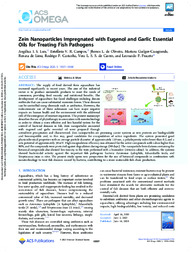Embrapa Amapá
 Busca de Publicações
Busca de Publicações
Zein nanoparticles impregnated with eugenol and garlic essential oils for treating fish pathogens.
Autoria: LUIS, A. I. S.; CAMPOS, E. V. R.; OLIVEIRA, J. L. de; GUILGER-CASAGRANDE, M.; LIMA, R. de; CASTANHA, R. F.; CASTRO, V. L. S. S. de; FRACETO, L. F.
Resumo: Abstract: The supply of food derived from aquaculture has increased significantly in recent years. The aim of this industrial sector is to produce sustainable products to meet the needs of consumers, providing food security and nutritional benefits. The development of aquaculture has faced challenges including disease outbreaks that can cause substantial economic losses. These diseases can be controlled using chemicals such as antibiotics. However, the indiscriminate use of these substances can have major negative impacts on human health and the environment with the additional risk of the emergence of resistant organisms. The present manuscript describes the use of phytotherapy in association with nanotechnology in order to obtain a more effective and less harmful system for the control of bacterial diseases in fish. Zein nanoparticles associated with eugenol and garlic essential oil were prepared through antisolvent precipitation and characterized. Zein nanoparticles are promising carrier systems as zein proteins are biodegradable and biocompatible and, in this way, good candidates for encapsulation of active ingredients. The system presented good physicochemical properties with an average particle diameter of approximately 150 nm, a polydispersity index lower than 0.2, and a zeta potential of approximately 30 mV. High encapsulation efficiency was obtained for the active compounds with values higher than 90%, and the compounds were protected against degradation during storage (90 days). The nanoparticle formulations containing the botanical compounds also showed less toxicity in the tests performed with a biomarker (Artemia salina). In addition, the systems showed bactericidal activity against the important fish pathogenic bacteria Aeromonas hydrophila, Edwardsiella tarda, and Streptococcus iniaein vitro. The present study opens new perspectives for the use of botanical compounds in combination with nanotechnology to treat fish diseases caused by bacteria, contributing to a more sustainable fish chain production.
Ano de publicação: 2020
Tipo de publicação: Artigo de periódico
Unidade: Embrapa Meio Ambiente
Palavras-chave: Alho, Aquicultura, Bactéria, Doença Animal, Fitoterapia, Peixe de Água Doce, Zeína

